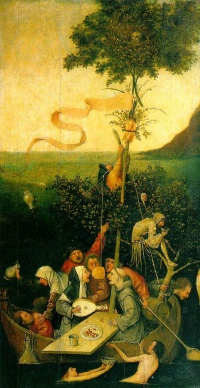Medieval satire
From The Art and Popular Culture Encyclopedia
|
Related e |
|
Featured: |
In the Early Middle Ages, examples of satire were the songs by Goliards or vagants now best known as an anthology called Carmina Burana and made famous as texts of a composition by the 20th-century composer Carl Orff. Satirical poetry is believed to have been popular, although little has survived. With the advent of the High Middle Ages and the birth of modern vernacular literature in the 12th century, it began to be used again, most notably by Chaucer. The disrespectful manner was considered "Unchristian" and ignored but for the moral satire, which mocked misbehaviour in Christian terms. Examples are Livre des Manières by Étienne de Fougères (~1178), and some of Chaucer's Canterbury Tales. The epos was mocked, and even the feudal society, but there was hardly a general interest in the genre.
Two major satirists of Europe in the Renaissance were Giovanni Boccaccio and François Rabelais. Other examples of Renaissance satire include Till Eulenspiegel, Reynard the Fox, Sebastian Brant's Narrenschiff (1494), Erasmus' Moriae Encomium (1509), Thomas More's Utopia (1516), and Carajicomedia (1519).
More examples
- Cena Cypriani ("Feast of Cyprian"), an anonymous prose work written in Latin
- Drinkers Mass, or Gamblers Masses, a genre of medieval Latin poetry which parodied the Roman Catholic Latin Mass
- Feast of Fools, the name given to a specific feast day celebrated by the clergy in Europe, initially in Northern France
- Feast of the Ass, (Latin: Festum Asinorum or asinaria festa, French: Fête de l'âne) was a medieval, Christian feast observed on January 14, celebrating the Flight into Egypt
- Sermon joyeux, burlesque sermons
References
- La satire en France au moyen-âge (1883) by Charles Lenient
- Parodie im Mittelalter (1922) by Paul Lehmann
- Rabelais and His World (1965) by Mikhail Bakhtin
- Parody in the Middle Ages: The Latin Tradition (1996) by Martha Bayless
See also
- Middle Age Roman Catholic parodies and additions to the Mass
- Medieval vernacular literature
- Medieval caricature
- Medieval culture
- Risus paschalis
- Satire#Medieval_Europe
- History of laughter
- Renaissance satire


